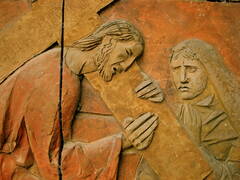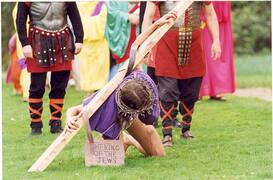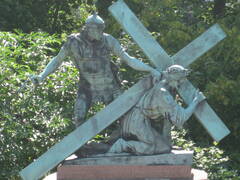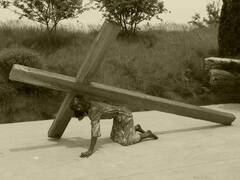Third Station of the Cross
Jesus falls for the first time
with Cardinal Joseph Ratzinger 
Good Friday 2005, at the Colosseum in Rome
From the Book of the Prophet Isaiah (53: 4-6):
And yet ours were the sufferings he bore, ours the sorrows he carried. But we, we thought of him as someone punished, struck by God, and brought low. Yet he was pierced through for our faults, crushed for our sins. On him lies a punishment that brings us peace, and through his wounds we are healed.
Meditation
Man has fallen, and he falls always anew: how many times he becomes a caricature of himself, no longer the image of God, but something that makes a mockery of the Creator. Is not the image of man par excellence the man who, going down from Jerusalem to Jericho, was attacked by robbers who stripped him and left him half-dead, bleeding beside the road? The fall of Jesus beneath the Cross is not only the fall of the man Jesus already exhausted by the scourging. Something more profound emerges here, as Paul says in the Letter to the Philippians: “His state was divine, yet he did not cling to his equality with God but emptied himself to assume the condition of a slave, and became as men are ... He was humbler yet, even to accepting death, death on a cross” (Phil 2:6-8). In the fall of Jesus beneath the weight of the Cross, the entire course of his life appears: his voluntary abasement, to lift us up out of our pride. And at the same time, the nature of our pride emerges: the arrogance with which we want to emancipate ourselves from God and be nothing other than ourselves, with which we believe we do not need eternal love, but with which we want to shape our lives on our own. In this rebellion against truth, in this attempt to be our own god, to be creators and judges of ourselves, we fall headlong and end up by destroying ourselves. The abasement of Jesus is the surpassing of our pride: by his abasement he raises us up. Let us let him raise us up. Let us cast off our self-sufficiency, our false illusions of autonomy, and instead learn from him, from the one who abased himself, to find our true grandeur, abasing ourselves and turning to God and to our downtrodden brothers.
Prayer
Lord Jesus, the weight of the cross made you fall to the ground. The weight of our sin, the weight of our arrogance, brought you down. But your fall is not the sign of a tragedy, it is not the pure and simple weakness of the one trampled upon. You wanted to come among us who, through our arrogance, were laid low. The arrogance to think that we can produce man has meant that men have become a kind of commodity, to be bought and sold, which are like a reservoir of material for our experiments, with which we hope to overcome death by ourselves, whereas, in truth, we are doing nothing other than debasing the dignity of man ever more profoundly. Lord, help us because we have fallen. Help us to abandon our destructive arrogance and, by learning from your humility, be raised anew.
Our Father... Oh, how sad and sore distressed was that Mother highly blessed of the sole begotten One!
Music: from 'Triduum - Contemporary Sacred Music' by David Bevan & Neil Wright.
To download the free mp3 audio recordings individually, right / double click on the blue play buttons.
Or subscribe to the Via Crucis podcasts in English, French, German, Italian, Portuguese & Spanish on Spotify, iTunes or from Totus2us' RSS feeds.
with Julian of Norwich 
We adore you, O Christ, and we praise you.
Because by your holy cross you have redeemed the world.
Although he was Son, he learned to obey through suffering, that being made perfect he might become the source of eternal salvation to all who obey him. (Hebrews 5: 8-9)
When Adam fell, God's Son fell, as God's Son chose not to be parted from Adam. For Adam signifies to my understanding Everyman. Adam fell from life to death, into the vale of this wretched world and after that into hell; God's Son fell, with Adam, into the vale of the Maiden's womb, who was the fairest daughter of Adam; and for this end: to excuse Adam from blame in heaven and on earth. (Julian of Norwich - XIV Revelation, Ch 51)
I love you Jesus, my love, above all things; I repent with my whole heart for having offended you.
Never permit me to separate myself from you again.
Grant that I may love you always, then do with me as you will.
Our Father ...Hail Mary ... Glory be.
with Pope St John Paul II in the Jubilee
Good Friday, 21 April 2000, at the Colosseum in Rome
- also in French, German, Italian, Portuguese & Spanish
“God laid on him the sins of us all” (cf Is 53:6).
“All we like sheep have gone astray;
we have turned every one to his own way;
and the Lord has laid on him the iniquity of us all” (Is 53:6).
Jesus falls under the Cross. This will happen three times along the comparatively short stretch of the “via dolorosa”.
Exhaustion makes him fall. His body is stained with blood from the scourging, his head is crowned with thorns. All this causes his strength to fail.
So he falls, and the weight of the Cross crushes him to the ground.
We must go back to the words of the Prophet, who foresaw this fall centuries earlier. It is as though he were contemplating it with his own eyes: seeing the Servant of the Lord, on the ground under the weight of the Cross, he tells us the real cause of his fall. It is this: “God laid on him the sins of us all”.
It was our sins that crushed the divine Condemned One to the ground.
It was our sins that determined the weight of the Cross that he carries on his shoulders.
It was our sins that made him fall.
With difficulty Christ gets up again to continue his journey.
The soldiers escorting him urge him on with shouts and blows.
After a moment the procession sets out again.
Jesus falls and gets up again.
In this way, the Redeemer of the world addresses in a wordless way all those who fall. He exhorts them to get up again.
“He himself bore our sins in his body on the wood of the cross, that we might no longer live for sin but for righteousness – by his wounds we have been healed” (cf 1 Pt 2:24).
Prayer
O Christ, as you fall under the weight of our faults
and rise again for our justification,
we pray, help us
and all who are weighed down by sin
to stand up again
and continue the journey.
Give us the strength of the Spirit
to carry with you the cross of our weakness.
To you, O Jesus, crushed under the weight of our faults
be our praise and love for ever. Amen.
with Papa San Giovanni Paolo II in 2003
- also in French, German, Italian, Portuguese & Spanish
From the Book of the Prophet Isaiah (53: 4-6):
Surely he has borne our griefs and carried our sorrows; yet we esteemed him stricken smitten by God, and afflicted. But he was wounded for our transgressions, he was bruised for our iniquities; upon him was the chastisement that made us whole, and with his bruises we are healed. All we like sheep have gone astray; we have turned every one to his own way; and the Lord has laid on him the iniquity of us all.
Meditation
Jesus falls under the weight of the Cross. He falls to the ground. He does not resort to his superhuman powers, he does not resort to the power of the angels. "Do you think that I cannot appeal to my Father, and he will at once send me more than twelve legions of angels?" (Mt 26:53). He does not ask for that. Having accepted the cup from the Father's hands (Mk 14:36) he is resolved to drink it to the end. This is as he wills it. And so he has no thoughts of any superhuman force, although such force is at his disposal. Those who saw him when he showed his power over human infirmities, crippling diseases and even death itself, may well, in their grief, have wondered: "What now?" "Is he repudiating all that?" In a few days the disciples on the road to Emmaus would say: "We had hoped" (cf Lk 24:21). "If you are the Son of God...." (Mt 27:40), the members of the Sanhedrin were to fling at him. And the crowd would yell: "He saved others but he cannot save himself" (Mk 15:31: Mt 27:42).
He accepts these provocations, which seem to undermine the whole meaning of his mission, his teaching, his miracles. He accepts them all, for he is determined not to combat them. To be insulted is what he wills. To stagger and fall under the weight of Cross is what he wills. He wills it all. To the end, down to the bitter end, he is faithful to what he had said: "Not my will, but yours be done" (cf Mk 14:36, etc).
God will bring forth the salvation of humanity from Christ's falling beneath the weight of the Cross.
Acclamation
Jesus, meek lamb, Redeemer, you bear the sin of the world.
Kyrie, eleison.
Jesus, our companion at times of suffering, you share in our human weakness.
Kyrie, eleison.
with St John Henry Newman
V. We adore you, O Christ, and we bless you.
R. Because by your holy Cross you have redeemed the world.
Jesus, bowed down under the weight and the length of the unwieldy Cross, which trailed after Him, slowly sets forth on His way, amid the mockeries and insults of the crowd. His agony in the Garden itself was sufficient to exhaust Him; but it was only the first of a multitude of sufferings. He sets off with His whole heart, but His limbs fail Him, and He falls.
Yes, it is as I feared. Jesus, the strong and mighty Lord, has found for the moment our sins stronger than Himself. He falls — yet He bore the load for a while; He tottered, but He bore up and walked onwards. What, then, made Him give way? I say, I repeat, it is an intimation and a memory to thee, O my soul, of thy falling back into mortal sin. I repented of the sins of my youth, and went on well for a time; but at length a new temptation came, when I was off my guard, and I suddenly fell away. Then all my good habits seemed to go at once; they were like a garment which is stripped off, so quickly and utterly did grace depart from me. And at that moment I looked at my Lord, and lo! He had fallen down, and I covered my face with my hands and remained in a state of great confusion.
Pater, Ave, Gloria ...
V. Have mercy on us, O Lord.
R. Have mercy on us.
May the souls of the faithful, through the mercy of God, rest in peace. Amen.



